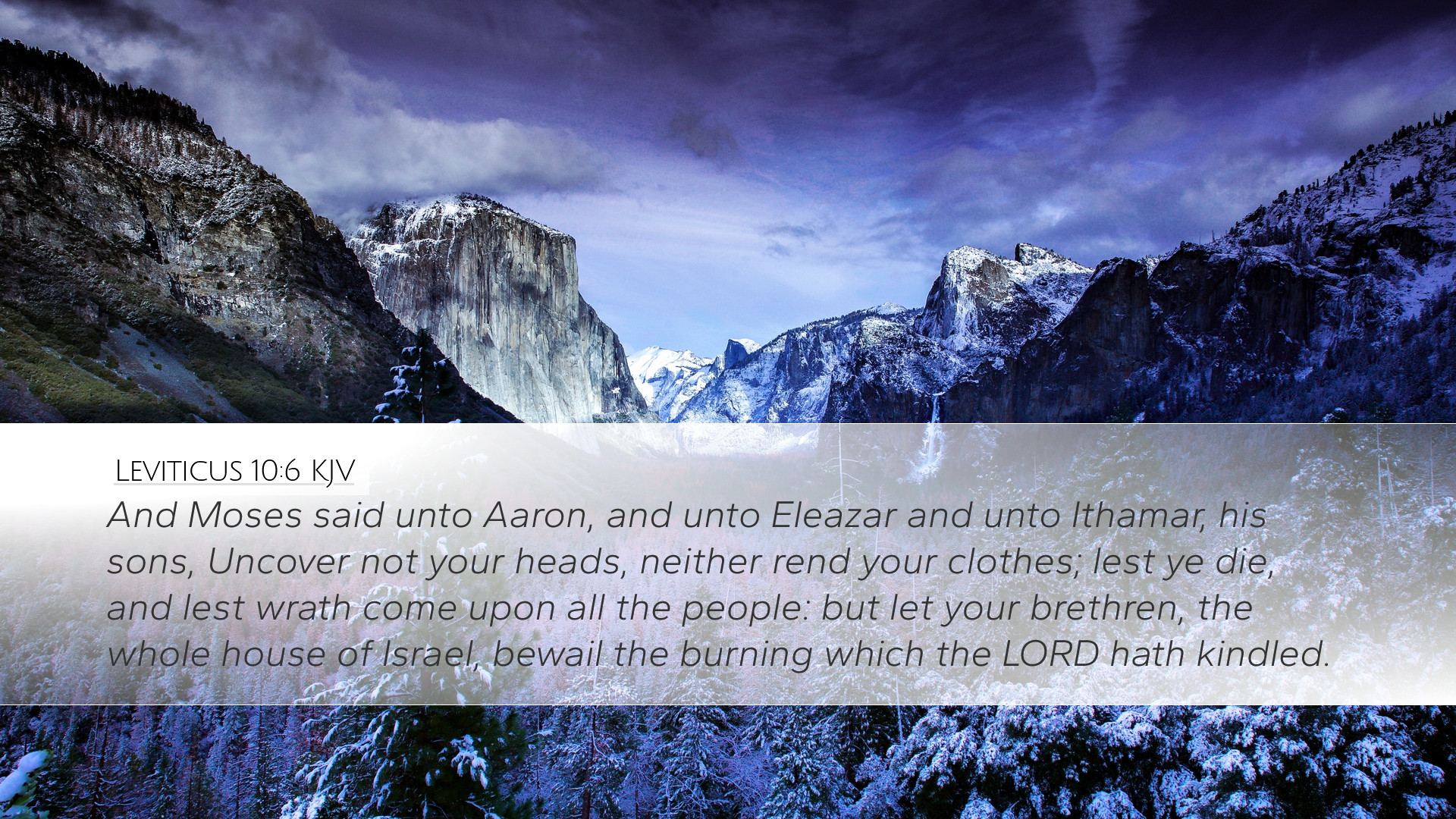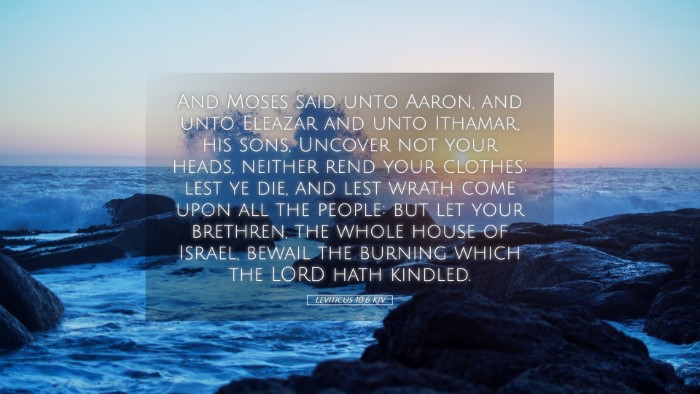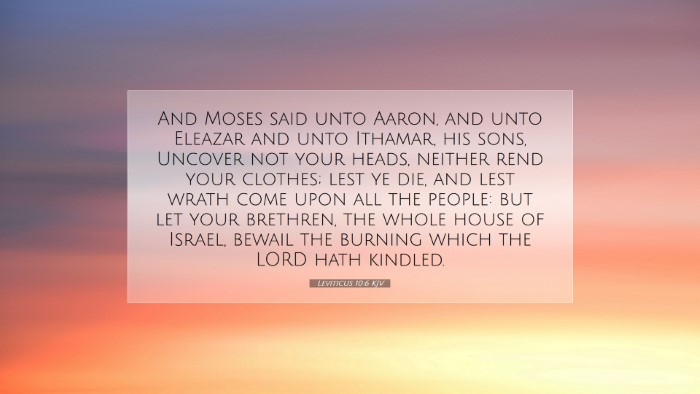Commentary on Leviticus 10:6
Verse Reference: Leviticus 10:6 - "And Moses said unto Aaron, and unto Eleazar and unto Ithamar, his sons, Uncover not your heads, neither rend your clothes; lest ye die, and lest wrath come upon all the people: but let your brethren, the whole house of Israel, mourn the burning which the Lord hath kindled."
Introduction
This verse captures a moment of profound significance in the context of Aaron and his sons, following God's judgment upon Nadab and Abihu for their unauthorized offering of strange fire. The backdrop of this instruction reveals the delicate balance between divine holiness and human emotional response. In this commentary, insights from Matthew Henry, Albert Barnes, and Adam Clarke provide depth to understanding this pivotal moment in Israel's early worship practices.
Understanding the Context
The preceding chapter (Leviticus 9) concludes with the consecration of Aaron and his sons as priests, marking their inauguration into a sacred ministry. Immediately following this passage, Nadab and Abihu's actions serve as a stark warning against irreverent worship. This context is crucial for interpreting Moses’ command to Aaron and his sons.
Henry's Insights
Matthew Henry emphasizes the seriousness of the moment by highlighting the dual role of the priests: they are both ministers of God and also part of the community. He notes that the mourning for Nadab and Abihu's sin should not eclipse their divine service, as it could invoke further judgment upon Israel. Henry states:
- Unity in Office: The priests must remain focused on their duties, emphasizing that the entire house of Israel shares in the consequences of the priests' actions.
- Understanding Divine Wrath: The command against mourning outwardly reflects an understanding of God's potential wrath, which could extend to the community due to the seriousness of the offense committed by Nadab and Abihu.
Barnes’ Commentary
Albert Barnes contextualizes Aaron's position as both a father mourning the loss of his sons and as a high priest in a holy service to God. He notes the following crucial aspects:
- Prohibition of Mourning: The act of uncovering heads and rending garments was a sign of deep mourning in Israelite culture. By restricting these actions, Moses is instructing Aaron to maintain his priestly dignity and calling.
- Mourning in Spiritual Context: Barnes articulates that the true mourning should be inward and spiritual, acknowledging the severity of the situation without compromising one's responsibility before God.
Clarke’s Contributions
Adam Clarke offers a detailed examination of the cultural practices surrounding mourning and their implications in this context. He points out:
- Cultural Symbolism: The uncovered head symbolized a state of grief and loss, while the torn garment indicated great calamity.
- Leadership in Worship: Clarke emphasizes that the act of not mourning outwardly displays a commitment to God's holiness above personal sorrow, thereby setting an example for the community.
- Consequences of Unholy Worship: He also reflects on the broader implications of Nadab and Abihu's actions, reinforcing the idea that proximity to God’s service requires utmost reverence and compliance with divine regulations.
Theological Significance
From these insights, several theological themes emerge:
- The Holiness of God: This passage underscores the necessity of approaching God with the proper reverence and order. The tragic fate of Nadab and Abihu serves as a somber reminder of the consequences of irreverent worship.
- Priestly Responsibility: Aaron's duties involve not only personal piety but also communal leadership. His need to forgo mourning reveals the weight of responsibility shouldered by those appointed to sacred roles.
- Emotional Restraint in Worship: The balance between human emotion and divine service is crucial. Pastors and leaders are reminded that while grief is natural, it must not overshadow their faithfulness to God’s commands.
Application for Today’s Church
For contemporary pastors, students, and theologians, Leviticus 10:6 serves as a challenge to examine the role of emotional expression in worship settings:
- Cultivating Reverence: How can church leadership maintain reverence for God while acknowledging the natural responses of their congregations to tragedy and loss?
- Understanding Community Impact: The interconnectedness of individual actions and community health is a critical theme. Leaders must recognize their influence on the entire body of believers.
- Leading by Example: Just as Aaron was instructed to focus on his priestly duties, leaders today are called to demonstrate a commitment to God's holiness even amidst personal sorrows.
Conclusion
Leviticus 10:6 encapsulates a critical intersection of divine judgment, human emotion, and priestly responsibility. Through the collective voices of Henry, Barnes, and Clarke, it becomes evident that this passage invites reflection not just on the actions of Nadab and Abihu, but on the ongoing responsibilities of leaders in God’s service. As we engage with this text, may we draw wisdom from both its historical context and its implications for contemporary worship and spiritual leadership.


